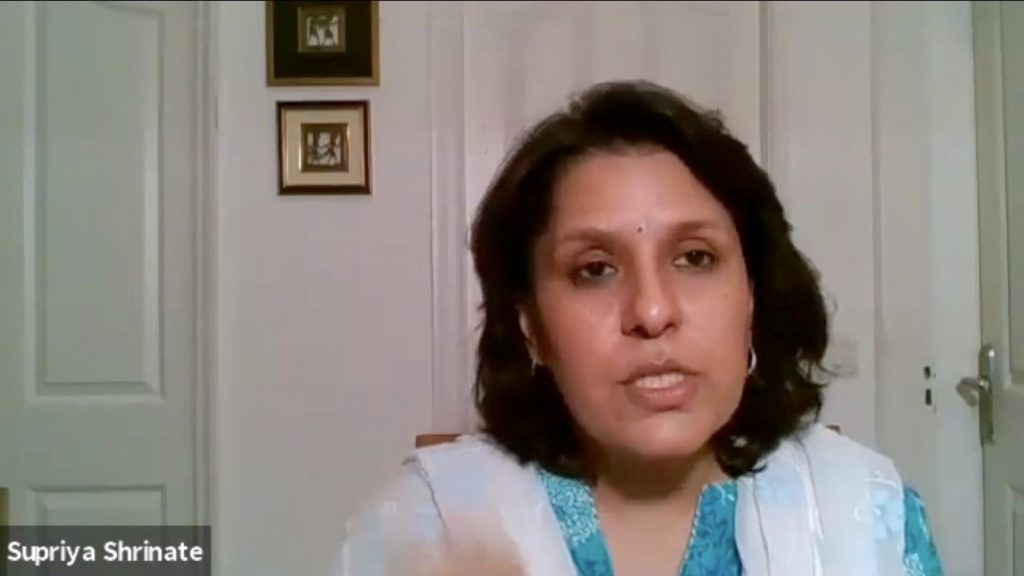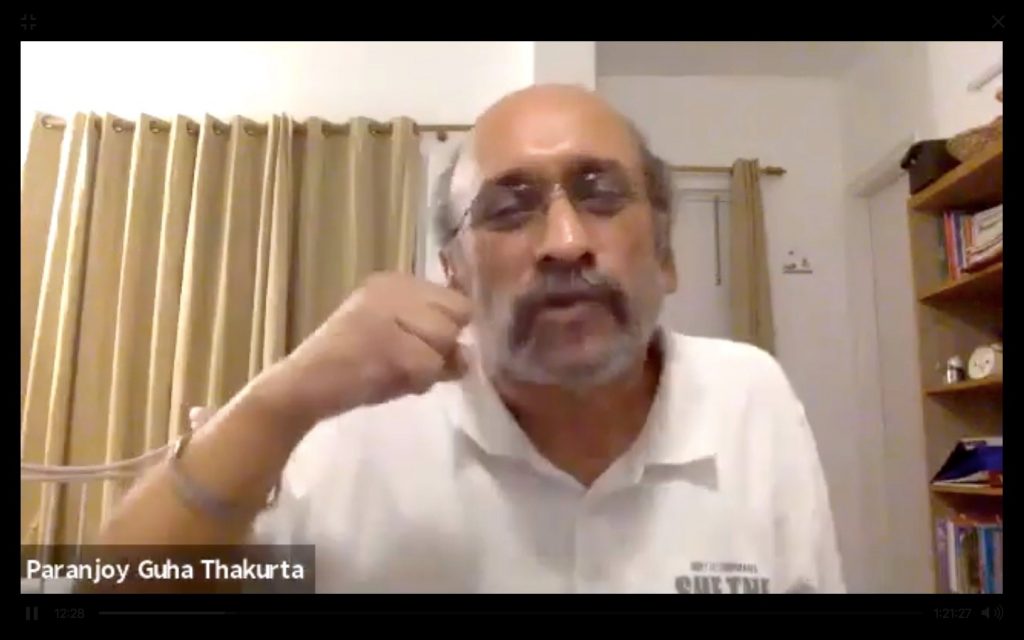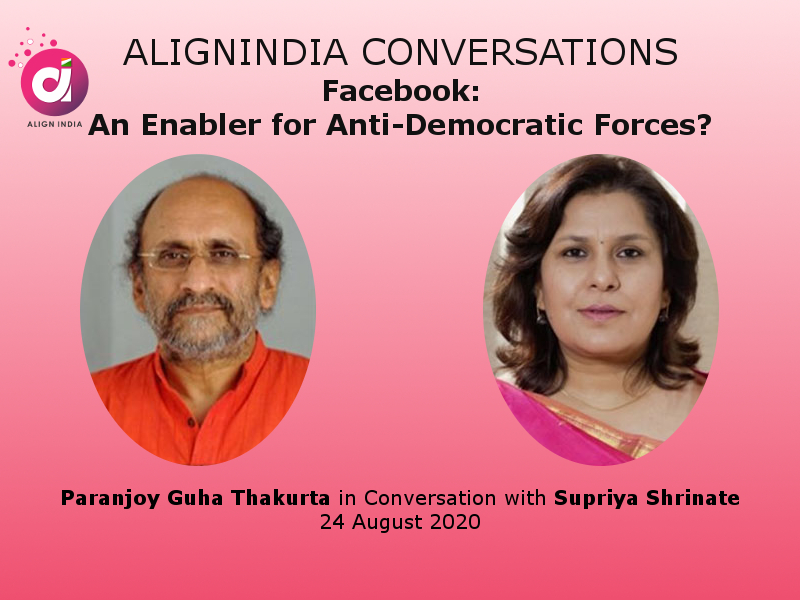Transcript by Susheelkumar S Hallur
AIPC and AlignIndia Zoomathon on
Featuring Paranjoy Guha Thakurta and Supriya Shrinate
on August 24, 2020
Introduction
AIPC in association with AlignIndia organised a webinar in its #ProfessionalsSpeak series on 24th August 2020. This session was a conversation between Paranjoy Guha Thakurta (Journalist and author The real face of Facebook in India) and Supriya Shrinate (National spokesperson and member Co ordination group, INC). It was organised as a conversation on “Facebook: An enabler or Anti democratic force”. It was an attempt to answer the question – Has BJP been using Facebook for propaganda lobbying?
The webinar was organised into three segments
i. Conversation between Paranjoy Guha Thakurta and Supriya Shrinate.
ii. A Question and Answer session with the audience
iii. Vote of Thanks
i) Conversation between Paranjoy Guha Thakurta and Supriya Shrinate
The conversation was started by Smt. Supriya. She told us that she was more of a Twitter person and not a Facebook person. However, off late she was alarmed to notice that FaceBook was becoming a source of misinformation that people keep quoting all the time. She gave us an interesting anecdote from her campaign days. Even though she was contesting from a rural constituency she was surprised by the level of penetration that Facebook had. She noticed that people were active in FaceBook/WhatsApp and they would often quote it as source of information. So much so that at times it even replaced the daily News Paper as the primary source of information. Even though she had been talking about Whatsapp University for long, seeing its presence even in the far off rural cities of India was an eye opener for her.
Smt. Supriya then recalled Shri Narendra Modi’s visit to Facebook Head quarters in 2015. It was then that the level of engagement BJP was having with FaceBook struck her. She then turned our attention to the recent wall Street Journal Exposé. This Exposé then cemented her concern and forced her to think – How much coordination is happening between FaceBook and the political parties? How much is this coordination affecting our Ideology? With this exposé now in the open, she then asked us to think for ourselves – How much Facebook is impacting our Democratic process? How much is Facebook impacting free and fair elections? She then asked Shri. Paranjoy about his views on these very important questions.

Shri Paranjoy first gave us an overview of Facebook. To give us an Idea of how big Facebook is, he informed us that if all the users of Facebook (Facebook+WhatsApp+Instagram+others) were combined, it would become bigger than the biggest country. To give us an Idea of how young Facebook is, he informed us that Facebook is 16.5 years old, the owner of Facebook is just 36 years old and it is already one of the biggest conglomerates in the world. When we have to understand from this, he said, tis that he entire social media phenomenon is very new and it has grown very quickly.

Shri Paranjoy then drew our attention to some facts about India. He informed us that there are more SIM’s (Subscriber Identity Module) in India than there are people. The estimated number of handsets in india is 750 Million. He then informed that the number of voters who turned 18 on Jan 1, 2019 was around 90 crores. This he then compared with the number of WhatsApp users in India, which was around 40 crores. When we see all these figure together we can conclude that Facebook/WhatsApp is not an urban phenomenon. It can be concluded that Facebook has spread all over India, even to remotest places.
Shri Paranjoy then drew our attention to the book he has co-authored – “The Real Face of Facebook in India” and gave us an overview of what he has written in this book. He told us that The Right wing was the first to use the Social Media and it was also the first to realise the potential of Social Media. This made them use the platform better. He also noted that Facebook had been actively helping Shri Narendra Modi from the time he was the chief Minister of Gujarat. He also gave a reason why Facebook was helping Shri Narendra Modi so much. He reasoned that if we observe carefully, Facebook has always been in the favour of the person in power. They do so because power is the source of money. He informed us that this cooperation which started from Gujarat than got carried over to 2019 Lok Sabha elections. In fact, this co operation was so deep that some of the top officials of Facebook were hand in glove with Shri Narendra Modi’s IT team. All these officials came together and glorified Shri Narendra Modi and made him into a larger than life, mythical and mythologized figure – using WhatsApp and Facebook. These officials also ensured that people at large got a belief that Islamophobia is something that could be tolerated. He encourage us to go and read his book in which he talks about all of this in great details. In the book he even gives names of the people involved.
Shri Paranjoy then gave us some examples of how Facebook has been misused globally. He told us about a report by an UN official who wrote about how WhatsApp had been misused for the Genocide of Rohingya Muslims. He reminded us how, in New Zealand a gunner had massacred more than 50 people outside a Mosque and then broadcasted it live. He gave us an example of how in the US Twitter put down content from the President considering it to be inappropriate. However, the same content was not deemed inappropriate by Facebook and it was not taken down.
Shri Paranjoy then came back to the wall street journey exposé and gave us his take on the entire episode. He said that what the exposé tells us is that within Facebook there are people who violate their own company’s rules believing that it is all for the good of business. This violation, he added, has encouraged battalions of trolls and ensured Facebook kept making money.
Shri Paranjoy then explained to us how Facebook manages to behave in such a Lawless fashion. He said that Facebook claims itself to be a Technology company and that it does an End to End encryption of information. By claiming so they appeal to the constitutional tenants of freedom of expression and Privacy. They also use this claim as a cover to do whatever they like. To explain this further, he gave us an example of how a killing in Rajasthan was video graphed and made Viral. However, when police went to Facebook asking them to trace the source of Video, they said that it could not be done. When asked why, they said it was not possible for them to know who originated it and who received it, since the information was encrypted End to End. Another reason, he said these kinds of happenings are ignored is because for Facebook Virility is good business. They do not care if the content is hateful or results in conflicts. He then shared a startling reality – In the last few years, behind every single Mob lynching or communal riots – There was a viral Facebook or Whatsapp post!
To further explain us how political parties have used this Facebook’s way of working to weaponise Social Media, he told us about a meeting of Shri Amit Shah with his Social Media volunteers. In the meeting Shri Amit shah boasted that they can make any message go Viral, irrespective of whether it was true or not. They were able to do it thanks to their WhatsApp group which has approximately 32 Lakh members. Each of these members were sent what is called “Know the truth” every morning. This army of 32 lakh whatsApp users then made the post viral. By doing so, they were able to mould the perception of voters to their convenience. Facebook on the other hand got good business due to this virility. After finishing sharing this important piece of information, he handed over to Smt. Supriya.
Smt. Supriya thanked Shri Paranjoy for sharing with us these important insights. She then lamented about how people think that anything that comes out of Facebook is the Gospel truth. She then drew our attention to the fact that Facebook has different rules for different countries. In Singapore, she said, Facebook says that they only host content and they wont remove it until someone explicitly objects to it. However, in India even after explicitly objecting to hateful content – no actions are taken. To make her point clearer, she gave a recent example where Facebook was able to prevent a suicide and save a life by proactively tracking the person and alerting the authorities. This proves that Facebook has the will and Technology to trace the originator of the content. However, they fail to use this will and Technology to clamp down on hateful content, when in fact doing so could prevent a potential riot and save the lives of many people.
Smt. Supriya then reminded us that India has some very special problems. She told us that we have a huge population of young people. Some of these youngsters are not very savvy and cannot check what is fake and what is not, they simply take what is available in Facebook on its Face value. She reminded us that there is also a disturbing trend of joblessness among these youngsters. She felt perhaps this is the reason why so many people are available on platforms like TikTok. She then said that the way in which FaceBook and Whatsapp can be used to influence the impressionable mind of these youngsters was a big cause of worry for her.
Smt. Supriya then turned her attention to funding and business decisions of Social Media companies. She asked to to connect the dots to understand these decisions for ourselves. She told us that Shri Sundar Pichai informed Alphabet will invest 10 million in India, a few days later a major chunk of it went to Jio. She told us that Facebook decides to do a largest minority state investment globally, this again goes to Jio for a record sum.
Smt. Supriya then drew our attention to an especially important point impacting our Society as a whole. She wondered why Facebook had no mechanism to clamp down misinformation that was detrimental to the very social fabric of our country. She wondered why this was so even after India has the biggest user base for Facebook Globally. with these questions she then turned to Shri Paranjoy asking for his comments on these important questions.
Shri Paranjoy agreed with Smt. Supriya on most youngsters not having formal education. He repeated what Shri Ravish Kumar said – Youngsters are growing up in Whatsapp university. He was also critical of the claim by Facebook that machines will take care of wiping out hateful content. He said that this was highly unlikely because it was a human who was coding these machines, and if a human does not want a machine to do the right thing – he simply codes it that way. He again reiterated how Facebook behaves in a lawless manner by using the cover of tech company. He also said that rumour mongering is not new. It has been around for ages. But what makes rumour mongering in Facebook so dangerous is the speed and scale at which Facebook is capable to do it. He further elaborated how Facebook work and make money. He said that companies like Facebook garner a behavioural surplus. The user feels that he or she can connect with friends and families free of cost. But, Facebook picks up every piece of information that is put out and monetises it. To understand this better, he urged the audience to read the Book – “The Age of Surveillance Capitalism: The Fight for a Human Future at the New Frontier of Power” by Shoshana Zuboff.
After explaining these working and impact of Facebook, Shri Paranjoy then told us how some of the institutions in India are allowing Facebook to get away with all this. He gave us an example of Election commission of India. He informed us that just before the 2019 Lok Sabha elections, the Election commission of India set up a committee to seek specific recommendations on how to handle Social Media during election time. This Committee consisted of people from a cross section of ministries. After the recommendations were tabled, the election commission itself choose to ignore these recommendations. Instead, they went by what the industry wanted and accepted that Social Media was an intermediary and not creator on Content. By doing this, they also agreed that if there was any incorrect content, Social media are not obligated to remove it until directed by authorities says so.
Shri Paranjoy then turned his attention to the observations that Smt. Supriya had made about Jio. He took us through the journey of Jio and attempted to explain why it has seen such phenomenal growth. He informed us that Jio was in testing phase till 2016. But, suddenly in three years it became the number one Mobile operator in India. He encouraged us to visit his website and read the blogs he has written to understand how this had happened. He said that this happened because groups of Ministries worked in cohesion to tweak rules so that Jio was benefited. He asked us to think again – Why would Facebook invest 43000 crores to get a Minority stake in Jio? Why would they do when Indian Economy is in a Mess? Why choose a time when the entire global economy is shrinking? He said the answer for these questions is – Facebook now understands that it is no longer about content. Facebook wants to be in retail, medicine, Payments etc. And to do this the Global leader needs a local Bigwig. And this, he said, is the reason for investing such an amount in Jio.
Shri Paranjoy then recalled that some congress leaders also met Facebook officials and sought their support in exposing the Rafael deal. They met Facebook officials so that they can gain traction in Social Media. However, they did not get the kind of support that they had wished for. This happened because Facebook was already getting huge money from their business with BJP. Congress could not match the amount of spending BJP was doing. And for Facebook officials profits came before anything else.
Shri. Paranjoy then lamented that even though the constitution was clear that if there is something that has the potential to cause enmity amongst social class then it can be considered hateful, we are enable to enforce this on Social Media. Due to this loop hole the Social Media companies use the privacy and freedom of expression clause of the constitution selectively. They do so by doing what is politically convenient to them. By saying these wise words, he the handed over to Smt. Supriya
Smt. Supriya too agreed to Shri Paranjoy’s observations. He accepted that BJP currently has all the big bucks. She reminded us of the fact that 97% of all electoral bonds go to BJP. They then use this money to create fake news, propaganda and spread misinformation. While they do this, Facebook gets big business. Since Facebook is getting big business from BJP, any representation against the wrong doings of BJP go answered. With these final comments she opened the floor for question and answer session.
ii) Question and Answer Session
a. Sevak Milind asked: Can content publishing companies like Facebook be held ac-countable like the publishing industry since both are in broadcasting space?
Smt. Supriya answered this by saying that currently this was difficult because Facebook defines themselves as a technology company and insist that they host content. However, she also agreed that this is not completely true. She said that companies like Facebook are now allowed to work within the parliament and do branding exercises, which is clearly a violation of norms. In fact she even recollected that when this government came in power and presented its budget they told that the budget interview will be held on Facebook live and not by a qualified news editor. All these behaviour does not fit into the definition of a Technology company. Smt. Supriya then sought Shri. Paranjoy’s views on this.
Shri Paranjoy added that some countries in the world are trying to do treat Facebook as a publishing company but they have not yet succeeded.
b. Aditya Khanna asked: Can we not use class action suit for using fake account as a measure to clamp down on Fake news?
Shri Paranjoy said we do not have something like that in India. What we have here is Public interest litigation. He noted that MP’s have went on record saying that Facebook and BJP IT cell have a Non Disclosure Agreement (NDA) signed between them which makes it difficult to get the actual information and then file PIL’s
c. Yogendra Kapoor asked: If Indian public can be influenced by hate comments, then why BJP could not influence them in recent Delhi elections? Is Congress missing the point that the actual issues is that they are loosing the connect with people?
Smt. Supriya answered this by reminding that after UP elections BJP has not won a single state elections. They have lost 9 of out 9 elections after Lok Sabha elections. She added that however, the current worry was not only about winning elections but also about creating a false narrative that these platforms breed and allow to exist. Having said that she also agreed that congress connecting on the grass root is of course something that must be focused on and improved.
To these comments Shri. Paranjoy added that when you want to influence voter behaviour, social media is one of the options. Apart from that there are many Local issues, National issues, and most importantly the individual choice that influence the voting pattern. However, the strength of Shri Narendra Modi lies in the fact that he has succeeded in connecting with the individual and thereby personalising politics. By doing this the BJP and its supporters are working on a game plan to change the politics of India to US Presidential style and they are largely succeeding in it. He also felt that Congress had failed to utilise the social media due to lack of resources and monies and other resources. However, he urged that Congress as an opposition must challenge the fake narrative by finding low cost solutions. He also gave us few Ideas on how to do this. Some of his Ideas were, we should help people who are already busting fake news, support journalist who are calling out the failures of current regime by providing them with resources, and last but not the least – make short Videos explaining our point of view in all the regional languages so that it reaches people in large numbers. He also offered his support in doing some of these things.
d. Sanjay Chandrappa asked: How should we highlight that whole system is corrupted due to social media in BJP government and bring this to the mainstream?
Smt. Supriya felt that with Traditional Media not discharging its duty in the right way and social Media is colluding with the ruling party. Under these circumstances the only way to bring the corruption to the mainstream is by the people who are in the know of the things to speak and call out these issues with the government.
Shri Paranjoy said that congress should strive to be a more effective opposition. Congress should be actively campaigning against how the institutions are being demolished. He added that congress should even be ready to undo some of the mistakes that its successive governments have done. He said that Congress should raise issues with Election commission that impact free and fair elections even if the election commission seems to be compromised. He further urged us to start lobbying with US, France, Germany, New Zealand, and start telling them that tech companies like Facebook and Google have become too big and have to be broken down. He also told us that we should start asking if these tech companies should be treated like Public utilities so that right rules can be applied to them.
e. People in audience asked: Does the journalism projects that tech companies do fall under legal framework in India? There was a proposal to amend the IT law with a clause making it mandatory for Tech companies to host their servers in India what is the status of it? Can we not have a KYC mechanism for users of Social media as well so that each user is uniquely identified?
Shri Paranjoy felt that the bigger issues here is the disproportionate control Facebook and Google have over the whole data on the Internet. This figure he said was as high as 90%. The core issue is hence democratisation of the Internet. He accepted that this may be difficult but it was needed since this democratisation will decide if our children are fed the right kind of information. By saying that such a democratisation of Internet was a final answer to all the question asked above, he closed his remark and we moved to the Vote of thanks
iii) Vote of Thanks
The Vote of Thanks session started by Shri Alok Jagdhari. He first thanked both the speakers for a stimulating conversation. After that he shared with us some important facts that would help us put everything into perspective. He recalled how he gave an assignment to two of his brightest students post 2019 Lok Sabha elections. In this assignment he asked his students to go back in history and find all instances where First, find regimes that had risen to power through democracy which appeal to fascism, Nationalism, Majoritarianism, and Populism. Then second, after having risen to power were they ever replaced democratically or peacefully. He told us that his students could not find a single instance where this had happened. He even went out and declared price in Social media to find any instance where this had happened. Again, no one was able to give even one such example. He warned that this should really frighten us. He then said that after knowing the gravity of the situation we all should come with exceptional strategy and thought process so that we can prove history wrong. By saying this he requested Smt. Supriya and Shri Paranjoy to share their closing remarks.
Smt. Supriya in her closing remarks urged us to think Is this the kind of country we want to leave behind? She warned us that our social fabric is changing and we have to take steps to make the social media more positive.
Shri Paranjoy in his closing remarks than said that he believed we must work together to finish this herculean task. People of opposing views should come together just like Stalin, Roosevelt, and Churchill came together in Yalta to defeat fascism and end world war in 1945.
After this Shri Varughese thanked both Smt. Supriya and Shri Paranjoy for spending time with us on a Monday evening and enlightening us on this very important topic and closed the webinar.
Disclaimer: This is a transcript of a Web Discussion. The opinions expressed are the personal opinions of the respective speakers. AlignIndia does not take any responsibility for the opinions expressed.


